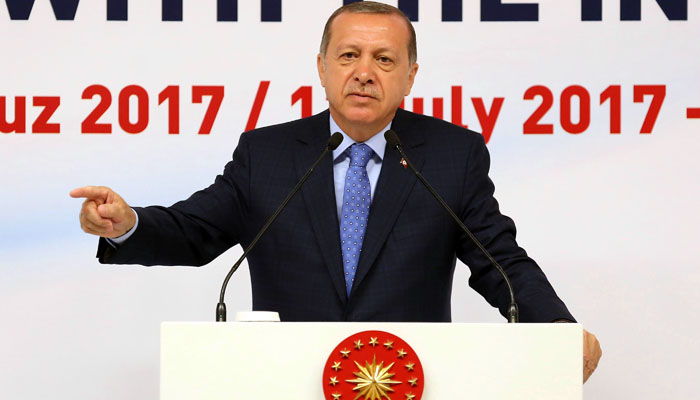President Rescep Tayyip Erdoğan has said a state of emergency (OHAL) declared by the Turkish government immediately after a failed coup on July 15 might end in the near future.
Erdoğan’s remarks came during a commemoration event in Ankara on Wednesday held to mark the anniversary of the coup attempt.
Referring to cases concerning the Gülen movement, accused by the Turkish government of planning the coup, and the fight against the Kurdistan Workers’ Party (PKK), Erdoğan said, “Even if we have been implementing it [state of emergency] in a limited area, the state of emergency might end in a future that is not so far off.”
President Erdoğan also referred to a “March of Justice” initiated by Republican People’s Party (CHP) leader Kemal Kılıçdaroğlu from Ankara on June 15 to İstanbul in protest of the arrest of CHP deputy Enis Berberoğlu.
“Under whose protection did they march, under our government’s protection. Did they rally, they did. You cannot say there is no security in the country. They are obsessed with OHAL, but you would not march so comfortably if there was no OHAL,” said Erdoğan.
Erdoğan, who also earlier argued on a BBC program that only two journalists were jailed in Turkey, said that “Turkey is not a country without press freedom” during his speech.
Criticizing Germany for not letting him speak to Turks in within their borders, he said: “Why wouldn’t you permit it? They are afraid of freedom of thought. We are not afraid of freedom of thought because we trust our thoughts.”
Erdoğan previously claimed that Germany was committing suicide by not allowing him to speak to Turks resident in the country.
Emergency rule was declared for three months on July 21. It was extended for another three months on Oct. 19, Jan.19, and April 19.
Under emergency rule, the government has pressed ahead with many controversial decrees that have the force of the law and are not required to be approved by Parliament. In line with these decrees, thousands of people have been purged from state bodies on coup charges.

